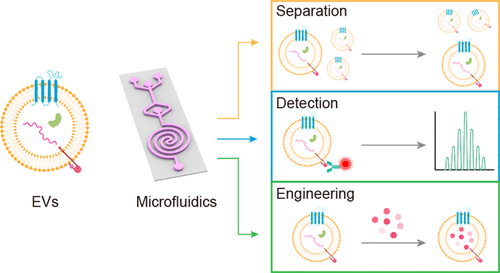当前位置:
X-MOL 学术
›
Acc. Mater. Res.
›
论文详情
Our official English website, www.x-mol.net, welcomes your
feedback! (Note: you will need to create a separate account there.)
Microfluidic Separation, Detection, and Engineering of Extracellular Vesicles for Cancer Diagnostics and Drug Delivery
Accounts of Materials Research ( IF 14.0 ) Pub Date : 2022-04-12 , DOI: 10.1021/accountsmr.1c00276 Fei Tian 1 , Chao Liu 1 , Jinqi Deng 1 , Jiashu Sun 1, 2
Accounts of Materials Research ( IF 14.0 ) Pub Date : 2022-04-12 , DOI: 10.1021/accountsmr.1c00276 Fei Tian 1 , Chao Liu 1 , Jinqi Deng 1 , Jiashu Sun 1, 2
Affiliation

|
Extracellular vesicles (EVs) are cell-derived submicron bioparticles composed of lipid bilayer membrane and molecular cargos, acting as important mediators of physiopathological cellular processes. The analysis and engineering of EVs hold significant therapeutic potential in noninvasive cancer diagnostics and innovative drug delivery systems. Despite significant improvements in technologies for EV investigation, the clinical use of EVs has been hampered by several challenges including the requirement of expensive equipment such as ultracentrifuge for EV isolation from clinical samples, laborious and time-consuming procedures for EV analysis, and large batch-to-batch variation for EV engineering. In this respect, microfluidic technologies have attracted increasing attention as promising avenues to accelerate the study of EVs by offering advantages of small-volume capacity, cost effectiveness, precise manipulation of bioparticles, streamlined workflows, high levels of sensitivity and specificity, and good reproducibility and stability.
中文翻译:

用于癌症诊断和药物递送的细胞外囊泡的微流体分离、检测和工程
细胞外囊泡 (EVs) 是由细胞衍生的亚微米生物颗粒,由脂质双层膜和分子货物组成,是细胞病理生理过程的重要介质。EV 的分析和工程在非侵入性癌症诊断和创新药物输送系统中具有显着的治疗潜力。尽管 EV 研究技术取得了显着进步,但 EV 的临床使用受到了一些挑战的阻碍,包括需要昂贵的设备,例如用于从临床样本中分离 EV 的超速离心机、用于 EV 分析的费力和耗时的程序以及大批量-电动汽车工程的批量变化。在这方面,
更新日期:2022-04-12
中文翻译:

用于癌症诊断和药物递送的细胞外囊泡的微流体分离、检测和工程
细胞外囊泡 (EVs) 是由细胞衍生的亚微米生物颗粒,由脂质双层膜和分子货物组成,是细胞病理生理过程的重要介质。EV 的分析和工程在非侵入性癌症诊断和创新药物输送系统中具有显着的治疗潜力。尽管 EV 研究技术取得了显着进步,但 EV 的临床使用受到了一些挑战的阻碍,包括需要昂贵的设备,例如用于从临床样本中分离 EV 的超速离心机、用于 EV 分析的费力和耗时的程序以及大批量-电动汽车工程的批量变化。在这方面,











































 京公网安备 11010802027423号
京公网安备 11010802027423号